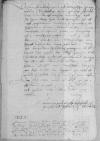Den ersamen, namhafftigen herrnn ⌊burgemeÿster und radtman derr koniglichen stadt Dantzke⌋, unsernnn gunstigen freundenn
Unsernn freuntlichen grus und alles guthen zuvoran. / Ersame, namhafftige hernnn, gunstige freunde. /
Nach dem dan uff vleissige, demuetige bytt dÿ hern ⌊rethe dÿser lande Prewssen⌋ ÿtzt uff negst gehaltenemm ⌊landtthag⌋ zu ⌊Grawdencz⌋ / der thugensamen frawen ⌊Barbara Bewtlerin⌋, witwe wonhafftig zu ⌊Thornnn⌋, / haben an ⌊konnigliche maiestet⌋ vorschrÿfft gethannn / und sy auss kleynnem bedrucken yrer nottorff / solcher vorschrÿfft dÿsmal kein copeÿ gefordert, / uns ytzt der halbenn schrÿfftlich ⌊⌋, / Ewer Erbarkeit, / dyweil wir wÿssen, das magistrats geergnis Ewer Erbarkeit secretarius solche vorschrifft gemacht und dy copeÿ beÿ ihm ÿst, / dorumb zu ersuchen. / Und byttenn Ewer Erbarkeit wol vorschaffen, das pringer diczt brives / der copeyenn ein abschrifft wurde zu gestaldt, / die ⌊frawenn⌋ zu yrem besten. / Das sein wir umb Ewer Erbarkeit zu beschuldennn geneygt. /
Datumm auss unserm slos ⌊Lobaw⌋, den XIX Octobris M D XXXVII.
⌊Ioanes⌋, von Gots gnaden colmischr byschoff, administrator zu ⌊Pomesann⌋ und postulirt zu ⌊Ermelandt⌋

